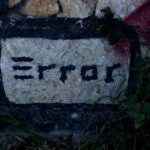We run our website the way we wished the whole internet worked: we provide high quality original content with no ads. We are funded solely by your direct support. Please consider supporting this project.

Must We Deny Biblical Infallibility to “Disarm” Scripture? A Review of Derek Flood’s Disarming Scripture: Part 1
Image by e³°°° via Flickr
Since I’ve been working on my own book dealing with the violent portraits of God in the Old Testament for the last eight and a half years, I was keenly interested in Derek Flood’s new book, Disarming Scripture: Cherry-Picking Liberals, Violence-Loving Conservatives, and Why We All Need To Learn to Read the Bible Like Jesus Did (San Francisco: MetaNoia Books, 2014). This is a well-written, very accessible, and over-all well-argued book. And in case you are among those us who have grown weary of the standard evangelical apologetic attempts to soften and/or excuse Scripture’s violence, I assure you that you’ll not find any of that in this book! Derek addresses the horrifically violent portions of Scripture, including its horrifically violent portraits of God, in a refreshing no-nonsense kind of way. At the same time, I’m quite sure many will agree with me that Flood’s proposed solution to this problem comes at too high a theological price, for it requires us to deny the inspiration and infallibility of all Scripture. [1] At the end of this review I will propose an approach that I believe resolves this problem without exacting this high price.
This review will focus primarily (though not exclusively) on the first half of Flood’s book, since this is the section in which he lays out his approach to violence in the Old Testament, which is my primary concern. I have divided this review into four parts that will be published on four consecutive days. Today I will simply outline Flood’s proposal. In Part II I will discuss the strengths of Flood’s approach and then begin to address what I consider to be its main weakness: namely, Flood’s rejection of biblical infallibility. In Part III I will critique Flood’s redefinition of the inspiration and authority of the Bible. And in Part IV I will outline an alternative approach that I believe accomplishes all that Flood wants to accomplish, and then some, but that is premised on the affirmation, rather than the denial, of biblical infallibility.
Part I
An Overview of Flood’s Proposal
Flood’s approach to violence in Scripture is based on what he calls the “hermeneutic of love” that he contends was employed by Jesus. This simply means that Jesus interpreted the Old Testament through the lens of his understanding of God as love and his experience of God using him to manifest this love. Flood contends that this hermeneutic led Jesus to prioritize some parts of Scripture over others (30) and to simply reject other parts (e.g., 42-4).
For example, Flood correctly notes that Jesus repudiated the “eye for an eye” command in the Old Testament and replaced it with his command to “not resist an evil person” and to love our enemies (Mt 5:38-9, 43-5) (23-6). In doing this, Jesus was doing nothing less than “overturning the very system of retributive justice embodied in the law, and replacing it with the superior way of God’s restorative justice rooted in…enemy love” (26). Along the same lines, Flood recounts the various ways Jesus violated certain Old Testament laws, such as the prohibition on touching “unclean” people, the prescription of capital punishment for adulterers and laws prohibiting picking grain or doing any work on the Sabbath (27-9). And Flood even goes so far as to argue that Jesus not only rejected Old Testament stories involving supernatural violence, such as Elijah’s calling down fire to incinerate people (2 Kg 1:1-10), he “attributes them to the way of the devil, rather than the way of God” (42).
Flood believes that Jesus adopted this hermeneutic because his reading of Scripture “was shaped by his own direct experience of God in his life” (238, cf., 234-8). In contrast to the historical-critical method that most contemporary exegetes employ to interpret Scripture, in which determining the originally intended meaning of a passage is all that matters, Flood argues that Jesus never divorced biblical interpretation from his life experience (71-89). Jesus knew he had been sent to teach and demonstrate God’s love, and this resulted in multitudes being healing and liberated. According to Flood, Jesus understood Scripture to be a vehicle to serve this end, which is why Flood believes he rejected anything that was inconsistent with love and anything that could harm people (42, 235-8).
Flood contrasts Jesus’ stance toward the Old Testament, which he calls “the way of faithful questioning,” with the way of the Pharisees, which he calls “the way of unquestioning obedience” (32, cf., 45). Flood argues that, unlike Jesus, the Pharisees blindly obeyed Scripture, even if doing so didn’t reflect love and ended up harming people. Moreover, by opposing the Pharisees, Flood argues, Jesus was standing in line with a minority tradition that can be found throughout the Bible, a tradition that always offered a prophetic critique of “the way of unquestioning obedience,” which is the more dominant tradition in Scripture. Borrowing heavily from the work of Walter Brueggemann, Flood illustrates how these two types of faith debate each other throughout the biblical narrative (33-44).
Most significantly, it is within the tradition of “unquestioning obedience” that we find violent depictions of God and violence being advocated. Indeed, Flood argues that the “the way of unquestioning obedience,” which Flood identifies with “Fundamentalism,” is inherently violent (48-52). And Flood sees the critique of this violence and of “the way of unquestioning obedience” that he offers in Disarming Scripture as standing in line with the way of “faithful questioning” that Jesus advocated. True biblical faith, as illustrated in the minority biblical tradition as well as in the life of Jesus, always dares to question Scripture when it appears inconsistent with love (44-6, cf., 101).
In what was for me one of the most intriguing sections of this book, Flood argues that Paul also embraced a “questioning faith” stance toward Scripture and employed a hermeneutic of love that was similar to Jesus (47-70). Moreover, Flood argues that Paul, like Jesus, also read Scripture through the lens of what he experienced the Spirit doing in his ministry (238-9). And as was true of Jesus, Flood contends that this led Paul to prioritize some parts of Scripture over others and to flatly reject other parts that were inconsistent with love.
Flood offers a number of examples of how Paul’s love hermeneutic led him to selectively quote the Old Testament and to even at times delete parts of passages he was quoting. For example, in Romans 15 Paul quotes the beginning and end of Psalms 18:41-9 but omits the middle section where the Psalmist declares, “I destroyed my foes. They cried for help…to the LORD, but he did not answer…He is the God who avenges me, who puts the Gentiles under my feet” (53).
Flood goes so far as to argue that Paul sometimes quotes passages in ways that actually reverse their original meaning. For example, in Romans 3 Paul quotes three Psalms to demonstrate that no one, Jew or Gentile, is righteous before God (vss. 10-8). While Paul cites them to prove the universality of sin, however, these Psalms actually distinguish between “insiders” who are righteous and evildoers who are “outsiders” (55-7). So too, in I Corinthians 15:26, 55-7, Paul quotes a passage from Hosea (13:14) that was “calling for death” and transforms it into a passage that mocks death as Paul celebrates the victory of Christ (59-60). In these and a multitude of other ways, Flood argues, Paul was “reversing the original context, subverting it, redeeming it” (60).
While Paul and Jesus employed somewhat different interpretive strategies, Flood argues that for both, “[l]ove is the hermeneutical baseline” (69). And this is how Flood argues we should read the Bible today. Flood acknowledges that interpreting the Bible this way runs counter to the modern historical-critical approach that divorced ethics from exegesis on the grounds that the only thing that mattered was “the original meaning” of passages (71-89). While there is a place for the historical-critical approach, Flood argues that, when it comes to determining what the Bible means for us, we must follow Jesus and Paul and interpret “the biblical text in such a way that it leads to love and compassion” (69). And this means, among other things, that we must not blindly embrace violent portraits of God and narratives that advocate violence just because they are found within the canon.
While Flood believes we should start with “an unambiguous rejection” of Scripture’s “texts of terror,” he doesn’t believe we should stop there (104-5). Rather, in contrast to conservatives whose own “way of unquestioning obedience” requires them to minimize or excuse Scripture’s violence, and in contrast to liberals who simply ignore it, Flood argues that “we need to have the courage to face” this material “honestly, and to consider the ethical problems they clearly raise” (105). Among other things, this material can help us explore how “assumptions of religious violence in a text” may “have found their way into our own values and assumptions” (105). Wrestling with this material can thus help us face our own “blinders” and help us discern how “the line dividing good and evil cuts through the heart of every human being” (106, 112). In the vengeful hateful Psalms that cry out for the destruction of enemies, for example, we can perhaps see our own fallen tendency to want foes destroyed. At the same time, the “anger and ugliness” of these sorts of Psalms can “show us that we can be real and raw with God” (108).
Another way violent texts can help us is found when we “view these texts from the perspective of the victim, as Jesus so often did” (105). When we read “the Exodus story,” for example, we should do so not only from the perspective of the Israelites (and thus the biblical author) but also “from the perspective of the conquered Canaanites” (105-6). And, finally, Flood argues that, when wrestling with the violence advocated by certain passages, we must always try to discern “how Christ and his way of compassion, grace, and enemy love might point to better Jesus-shaped alternatives to the ones found in such passages” (106).
In the remainder of the book, Flood deals with a wide range of issues that I will simply mention. He begins with an excellent discussion of the need to read the Bible “on a trajectory” (117-48), contending that it is at least as important to understand the direction that the biblical narrative moves as it is to understand what any particular passage is saying. He then addresses several passages in the New Testament that some claim directly or indirectly advocate violence (149-69) and, in a chapter that struck me as strangely out of order, Flood follows this with practical advice on loving enemies (171-98). Flood then attempts to explain away Jesus’ violent eschatological teachings in the Gospel of Matthew, arguing that they reflect Matthew’s, not Jesus’, desire for his wicked oppressors to face a violent end (199-227). And he then ends his work by discussing a topic that I’m sure all who embrace biblical infallibility will have been wondering about from the start: namely, the nature of biblical authority (229-58). I will weave elements of this second half of Flood’s book into my assessment of the strengths and weaknesses of Disarming Scripture in the remaining three parts of this review.
In sum, based on what he believes is the precedent of Jesus and Paul, Flood advocates that we adopt a hermeneutic of love with a questioning faith posture to Scripture. And these stipulate that we never accept anything in Scripture that is contrary to love and that could potentially harm people. In Part II I will assess what I consider to be strengths of Flood’s proposal and will begin to discuss my main concern with it.
[1] To be clear, I will defend the view that the Bible is infallible in accomplishing all that God intends it to accomplish, which, as shall become clear later on, is ultimately to point us toward, and bring us into a relationship with, the God revealed in the crucified Christ. This concept of biblical infallibility has nothing to do with whether or not there are scientific or historical errors or internal contradictions in the Bible, which is why I prefer “infallibility” over “inerrancy.”
Category: General
Tags: Bible, Biblical Authority, Book Reviews, Derek Flood, Disarming Scripture
Related Reading

When the Last Few Moments Changes Everything
One of the central things ReKnew wants to accomplish is to challenge followers of Jesus to accept that the self-sacrificial love Jesus revealed on the cross is the definitive, and even the exhaustive, revelation of God’s character. Everything about God, we believe, should be understood through the lens of the cross. For most Christians, Jesus…

Loving God With All Of Your Mind
Rebecca-Lee via Compfight David D. Flowers posted this essay on loving God with your mind that reflects our stance on intellectual integrity as we approach Scripture. It even features a video clip of Greg talking about maintaining humility when we encounter ideas that are new to us and challenge our current understanding. It’s well worth…

Podcast: The Making of Crucifixion of the Warrior God with Tony Jones
Dan and Tony talk about Greg’s books Crucifixion of the Warrior God and Cross Vision. Tony reveals what it was like to work with Greg, what the publishing industry is like right now, and what prospective authors can do to publish their own book. Tony’s recent book is available here: Did God Kill Jesus http://traffic.libsyn.com/askgregboyd/Episode_0423b.mp3…

Crucifixion of the Warrior God Update
Well, I’m happy to announce that Crucifixion of the Warrior God is now available for pre-order on Amazon! Like many of you, I found that the clearer I got about the non-violent, self-sacrificial, enemy-embracing love of God revealed in Christ, the more disturbed I became over those portraits of God in the Old Testament that…

The God Who Embraces Our Doubt
Lawrence OP via Compfight Zack Hunt over at The American Jesus posted some of his thoughts on doubt, and it seemed fitting on this week before the Doubt, Faith & the Idol of Certainty conference to share what he had to say. We’re thinking he must have stumbled on Greg’s book or maybe God is…

When the Bible has Errors
In the previous post, we dealt with the question of why we are able to trust Scripture. But we need to explore this further because if you read the Bible carefully, you will find parts that look erroneous. Some aspects of the Bible don’t line up with what we know from history and science. Let’s…
